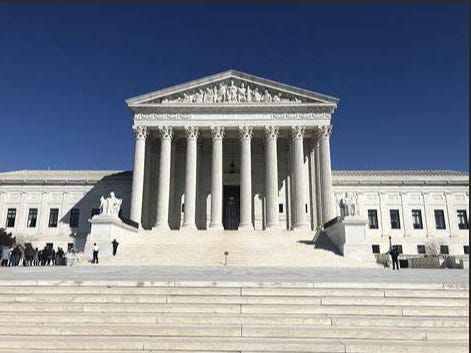- Joined
- Jul 13, 2007
- Messages
- 64,254
Why are Courts Reviewing a Non-Reviewable Presidential Act?
Judges from the highest court down to the district court level concede the Alien Enemies Act is largely immune from judicial review. So what exactly are the courts doing and what is the end game?
By Julie Kelly - Apr 22, 2025
There is still much to be said and analyzed related to the Supreme Court’s stunning sabotage of presidential power over the weekend with its 7-2 decision that again paused deportations of illegal Venezuelans covered by President Donald Trump’s Alien Enemies Act proclamation enacted last month. (My background on the overall controversy here.)
...
Perhaps most damning is the dissent authored by Justice Samuel Alito, joined only by Justice Clarence Thomas, which consisted of a stern rebuke of his seven bench mates for their hasty rush to judgement. “In sum, literally in the middle of the night, the Court issued unprecedented and legally questionable relief without giving the lower courts a chance to rule, without hearing from the opposing party, within eight hours of receiving the application, with dubious factual support for its order, and without providing any explanation for its order, Alito wrote on April 19, also Holy Saturday. “I refused to join the Court’s order because we had no good reason to think that, under the circumstances, issuing an order at midnight was necessary or appropriate.’
SCOTUS’ latest missive represents the second time the highest court has flexed its muscle to headlock, if even temporarily, the president’s top policy priority, one that is supported by a wide swath of the American people—which prompts two crucial questions: What happens next and why are the courts involved in a matter everyone appears to agree is exclusive presidential turf?
...
How a “Close Call” in Determining Separate of Powers is Anything But
But if judicial review is “limited,” how does the Supreme Court’s broad intervention in two separate AEA-related lawsuits meet that standard?So on one hand, SCOTUS admits their role—and the role of other courts—is “limited” but then takes a huge leap to prohibit the Trump administration from removing “any member of the putative class of detainees from the United States” under the Alien Enemies Act?
Further, how can the Supreme Court side with a “putative class of detainees”—meaning any illegal in the jurisdiction subject to deportation under the AEA—when it had just emphasized “individual” review under habeas?
What exactly is happening here?
Even Boasberg had acknowledged the thin line he crossed in ordering his initial halt on deportation flights. “Given the broad powers the Executive possesses in national security and foreign affairs, this issue is a close call,” Boasberg wrote in a March 24 opinion. He then continued to cite case law, including Ludecke v. Watkins, as the basis for proceeding anyway. (The Trump administration disputes his interpretation of that case law.)
Boasberg further admitted that the ACLU’s lawsuit “implicates a host of complicated legal issues, including fundamental and sensitive questions about the often-circumscribed extent of judicial power in matters of foreign policy and national security.”
...
Emboldened by SCOTUS, Colorado Judge Declares an Invasion is not an Invasion
According to immigration data, the number of Venezuelans entering the U.S. illegally skyrocketed under the Biden regime; over a half a million migrants from Venezuela crossed the border between 2021 and 2024; U.S. Customs and Border Protection encountered 334,914 Venezuelans in 2023 alone, making the country second only to Mexico in terms of illegals crossing the border.The president’s AEA seeks to immediately remove a small sliver of that number—Venezuelans who are 14 years or older with ties to Tren de Aragua, a multinational criminal enterprise designated a foreign terrorist organization by the Trump administration. But even this logical and popular policy is being sabotaged by an army of ACLU lawyers and federal judges including those on the Supreme Court.
And thanks to SCOTUS, other judges are now emboldened to further encroach on what has historically been considered a largely untouchable area of presidential purview. On Tuesday, Colorado Judge Charlotte Sweeney, a Biden appointee, took the existing judicial trajectory to a new level. Sweeney not only established guidance the Trump administration must follow related to AEA subjects in her jurisdiction— “twenty-one (21) day notice to individuals detained pursuant to the Act…and a notice of a right to seek judicial review, and inform individuals they may consult an attorney regarding their detainment and the government’s intent to remove them”—she also disputes the president’s finding that the influx of TdA gang bangers represents an “invasion” or “predatory incursion.”
“These words, fundamentally, demand military and wartime action,” Sweeney wrote. “The Proclamation makes no finding that satisfies these definitional demands. Thus, to the extent the Proclamation relies on the Act’s ‘invasion’ and ‘incursion’ provisions to justify its removal powers, it does so improperly.”
Way to go, SCOTUS.

Why are Courts Reviewing a Non-Reviewable Presidential Act?
Judges from the highest court down to the district court level concede the Alien Enemies Act is largely immune from judicial review. So what exactly are the courts doing and what is the end game?

